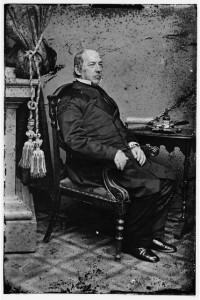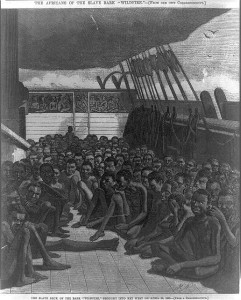And the Income to Buy Public Land Is Drying Up Anyway
150 years ago federal Cabinet departments had been submitting their annual reports to the president. The report of Caleb Blood Smith, the Secretary of the Interior, shows that the war had effected the department’s various bureaus. Here’s a bit of the report.
From The New-York Times December 6, 1861:
DEPARTMENT OF THE INTERIOR.; Report of Secretary Smith.
[ABRIDGED.]
DEPARTMENT OF THE INTERIOR, Nov. 30, 1861.
SIR: The report of the operations of this Department during the fiscal year ending June 30, 1861, will exhibit a diminished amount of business in some of the most important bureaus connected with the department. This is attributable mainly to the insurrection which has suddenly precipitated the country into a civil war.
GENERAL LAND OFFICE.
The decline of business has very sensibly affected the operations of the General Land Office. Official intercourse has been entirely suspended with all the Southern States which contain any portion of the public lands, and consequently no sales have been made in any of those States.
In all the Northern States in which any of the public lands are situated, the wad [war] has almost entirely suspended sales. The demand for volunteers has called into the ranks of the army a large number of that portion of our people whose energy and enterprise in time of peace incline them to emigrate to the west and settle upon the public lands, thus laying the foundations of future prosperous communities and States. Besides, the ordinary channels of trade and commerce have been so obstructed by the war that the sources of income, from which the settlers upon the public lands have realized the means of purchasing, have been greatly diminished. …
INDIAN AFFAIRS.
Our Indian affairs arc in a very unsettled and unsatisfactory condition.
The spirit of rebellion against the authority of the Government, which has precipitated a large number of States into open revolt, has been instilled into a portion of the Indian tribes by emissaries from the insurrectionary States.
The large tribes of Cherokees, Chicasaws, and Choctaws, situated in the southern superintendency, have suspended all intercourse with the agents of the United States. …
The tribes upon the Pacific slope of the Rocky Mountains have manifested a turbulent spirit, but have committed no acts of violence. With vigilance on the part of the agents it is hoped they may be restrained from depredations upon the white settlers, and be gradually brought under the control of the laws of the United States. …
I thought it was interesting that in the section on Pensions To Soldiers Smith noted that there were still 63 Revolutionary War soldiers and over 2700 Revolutionary War widows receiving pensions. Although there was less money required to pay pensioners in 1861, Smith noted:
The casualties of the conflict in which the Government is now engaged will increase the list of pensioners very largely. The amount of the increase cannot be estimated, as it will depend upon the duration of the war.
The Interior Department was also charged with the suppression of the African Slave Trade:
The subject was immediately taken in hand, under a deep sense of our obligation as a nation, to put an end, if possible, to this odious traffic, and with a full conviction that the power of the Government, in the hands of competent, honest and faithful officers, was adequate to the purpose. Among other things, I caused the Marshals of the loyal Atlantic States to assemble at New-York for consultation, in order to insure greater concert of action. They were thereby afforded an opportunity of inspecting vessels fully equipped for the African Slave-trade, and of seeing the arts and devices employed to disguise and conceal the real objects of their voyage, thus enabling them to detect and prevent the clearance of vessels designed for this trade. It is gratifying to know that unprecedented success has crowned the efforts of the past few months. Five vessels have been seized, tried, and condemned by the Courts. One slaver has been taken on the coast of Africa with about nine hundred negroes on board, who were conveyed to the Republic of Liberia. One person has been convicted at New-York as the captain of a slaver, having on board 800 captives, and two others, (mates, of a different vessel,) and another one at Boston for fitting out a vessel for the Slave-trade. In the first-named case the penalty is death; in the others it is fine and imprisonment. Hitherto convictions under the laws prohibiting the African Slave-trade have been very rare. …
I desire, in conclusion, to commend to your favorable notice the fidelity and zeal with which the various officers of the Department have discharged the public trusts committed to them. Their several reports herewith show the extent of their labors, and exhibit a highly satisfactory condition of the business of the different branches of the Department.
I have the honor to be, very respectfully, your obedient servant, CALEB B. SMITH,
Secretary of the Interior.
TO THE PRESIDENT.


